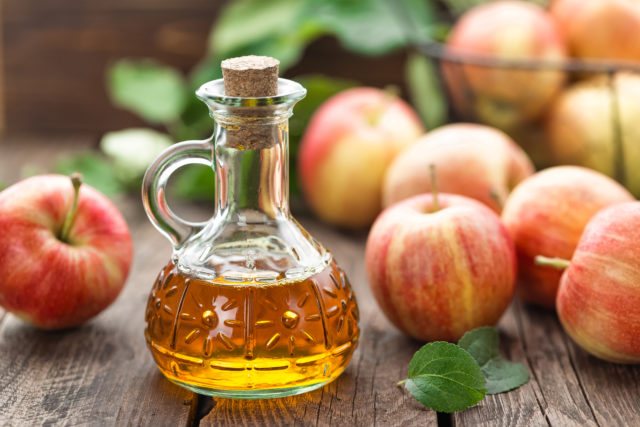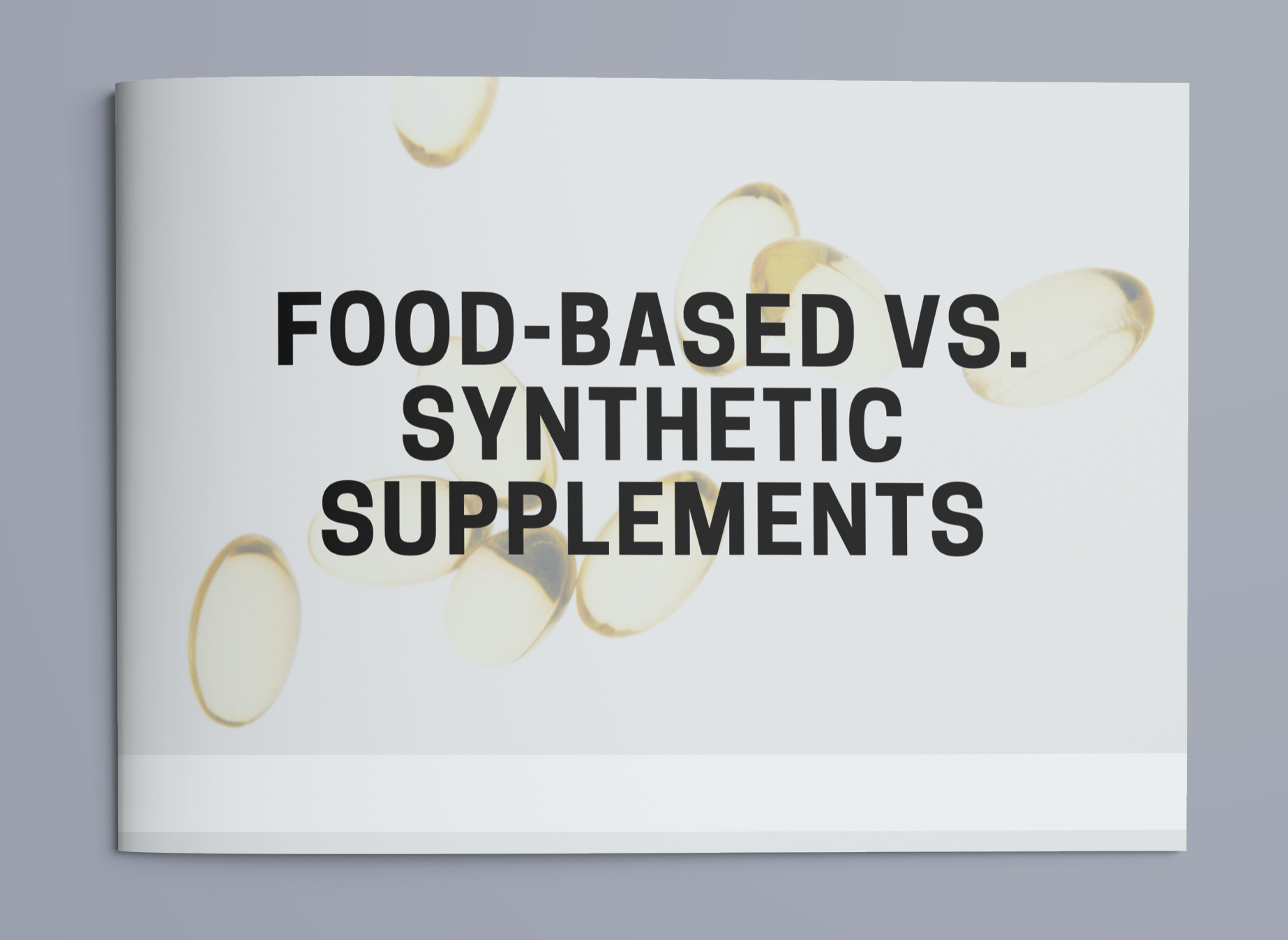15 Surprising Apple Cider Vinegar Benefits

Ready to uncover the 15 surprising benefits of apple cider vinegar? You’ve come to the right place!
There’s no shortage of marketing out there to tell you about the latest “superfood” or nutritional supplements that you must take. But, unfortunately, most of the time, this information is largely overblown and lacks any reliable research.
When it comes to apple cider vinegar, however, it’s another story. ACV has been used as a folk remedy for thousands of years. In fact, it’s said that Hippocrates, the father of medicine, used ACV as a cure for a range of illnesses all the way back in 400 BC.
So, what’s so great about apple cider vinegar, and should you have some in your pantry?
In this article, you’ll learn:
- The surprising nutrient density that gives ACV its cure-all reputation
- How ACV could be a strong ally in the fight against metabolic syndrome (and its comorbidities)
- Why the weight loss hype around ACV isn’t just hype
- And much more…
15 Surprising Apple Cider Vinegar Benefits
#1 Lowers Blood Sugar
Keeping your blood sugar levels stable is one of the most important things you can do for your health. High blood sugar can lead to a host of problems, especially for those with type 2 diabetes.
In type 2 diabetes, your cells become resistant to the hormone insulin, which is responsible for shuttling glucose into your cells. Therefore, blood sugar levels can rise without anywhere to put the sugar.
Research shows that consuming vinegar with meals can lower glucose levels following the meal. In addition, it’s suggested that the compounds in vinegar can help with insulin sensitivity, increasing your cell’s ability to take up glucose from the blood[1].
In one study, a group of people with insulin resistance were given a high-carbohydrate meal accompanied with vinegar to assess the impact that vinegar may have on blood glucose levels. The investigators reported that 60 minutes following the meal, the [participants who took the vinegar experienced a significant increase in whole-body insulin sensitivity, with lowered blood sugar as a result[2].
#2 Supports Weight Loss
One of the more popular uses of apple cider vinegar is to support weight loss. Although it may sound like a gimmick, there is some evidence to support this claim.
First, ACV’s impact on blood sugar indicates that it supports metabolic processes that are vital for energy production and utilization.
Furthermore, research shows that adding vinegar to your meals may enhance feelings of satiety. Acetic acid, which is an active compound in vinegar, is hypothesized to be responsible for the satiating effect[3].
The effects of ACV may be more prominent in obese individuals. In one study, a group of obese men was divided into three groups, receiving varying amounts of vinegar daily (with one group receiving none). At the end of the 12-week trial, the two groups receiving vinegar saw significant reductions in body weight, belly fat, and BMI[4].
#3 Reduces Blood Pressure
High blood pressure is a growing problem and is a major risk factor for heart disease. In animal studies, vinegar has been shown to reduce hypertension by way of its active compound acetic acid.
Acetic acid works by inhibiting the activity of an enzyme responsible for producing the hormone angiotensin. Angiotensin is involved in vasoconstriction, which makes your blood vessels smaller and therefore gives your blood less area to flow through, increasing the pressure. By blocking angiotensin, acetic acid allows blood vessels to stay dilated, reducing the pressure moving through[5].
While animal research confirms these outcomes, human trials are still needed[6].
#4 Lowers Triglycerides and Cholesterol
Along with its blood pressure-lowering activity, apple cider vinegar also supports heart health by assisting with cholesterol and triglyceride levels.
High cholesterol and triglycerides are common markers for heart disease. When levels of these two types of lipids increase in your blood, they can set the stage for atherosclerotic plaques.
Research shows that vinegar ingestion can lead to reductions in triglycerides and cholesterol (specifically, LDL cholesterol). The suggested mechanism is that acetic acid increases cholesterol excretion by producing and eliminating bile in waste while inhibiting the synthesis of triglycerides in the liver[7].
While cholesterol and triglycerides can set the stage for heart disease, oxidative stress also plays an important role. When lipids are oxidized, they become much more “sticky” and can easily find their way into plaques. Studies show that ACV may help to combat oxidative stress, and therefore reduce another risk factor for plaque formation[8].
#5 May Lower Risk For Metabolic Syndrome
Metabolic syndrome is characterized by a cluster of conditions that increase the risk of heart disease, stroke, and diabetes. These conditions include high blood pressure, high blood sugar, obesity, and high cholesterol levels.
While ACV will certainly not be a cure-all for metabolic syndrome, its potential benefits for blood sugar, blood pressure, obesity, and cholesterol may make it a promising adjuvant therapy for keeping these markers in check.
#6 May Help With Eczema
Keeping the acidity of your skin in balance is vital for skin health. In conditions like eczema, the skin can become too alkaline, which causes outbreaks and itching.
Research shows that topical application of acids can help treat these types of conditions. Vinegar has a lower pH (more acidic) and has been shown in animal studies to inhibit atopic dermatitis (a common type of eczema) and help maintain the pH of the skin[9].
#7 Acts As A Natural Antimicrobial
There is a growing demand for natural antimicrobials as antibiotic resistance continues to escalate. Antibiotics resistance occurs when microbes evolve to protect themselves against the effects of antimicrobials. When bacteria become resistant to the antibiotics that are meant to attack them, they can continue to grow and replicate.
Apple cider vinegar shows promise as a potential alternative to antibiotics due to its antimicrobial nature. Research shows that ACV is active against a range of microbes, including candida (yeast), E. coli (bacteria), and Staphylococcus aureus (bacteria).
In one in vitro study, researchers found that ACV works by downregulating cytokine expression (inflammatory molecules) while also impairing the integrity of the microbe’s cell walls[10].

#8 Antioxidant
Many of the benefits of apple cider vinegar can be attributed to its antioxidant content. Specifically, ACV is high in polyphenol compounds[11].
Research shows that taking ACV can increase the activity of antioxidant enzymes (superoxide dismutase and glutathione peroxidase), which help to protect your cells against oxidative damage[12].
Oxidative stress is at the root of many health concerns, so keeping your antioxidant activity in tiptop shape is crucial for the overall health of your body. While your body naturally produces reactive oxygen species in everyday life, the balance between this oxidative stress and antioxidant systems keeps you healthy[13].
#9 Supports a Healthy Scalp
Just like your skin, the health of your scalp relies on a healthy pH balance. Most shampoos are actually alkaline, which may lead to issues like dandruff, hair breakage, and dryness[14].
Apple cider vinegar is naturally acidic, with a pH that has been shown to support the health of your scalp. In fact, the National Psoriasis Foundation (NPF) recommends applying ACV to the scalp to relieve itchiness and other symptoms associated with this skin condition. They recommend using a one-to-one ratio of water and ACV and applying several times a week[15].
#10 May Help Fight Acne
Acne can stem from several different root causes; hormones, diet, inflammation, and so on. However, one common trait that almost all acne has in common is the presence of the bacteria Propionibacterium acnes. As previously mentioned, apple cider vinegar is naturally antimicrobial and does a fantastic job of wiping out bacteria[16].
What’s more, due to its balancing effect on your skin’s pH, it will also create an environment that is unwelcoming for the development of acne.
While ACV will likely not get to the root of your acne issues, it can certainly ask as an ally in the fight.
#11 May Help with Vaginal Candida Infections
As mentioned, apple cider vinegar can support your immune system by fighting off bacteria and other microbes.
Candida albicans is a common type of yeast that everyone has in their body in small amounts. The problem with candida is that it can cause infections most often in the vagina, gut, or mouth when it grows out of control. In the vagina, candida overgrowth is commonly called a yeast infection, while in the mouth, it is known as thrush. Left untreated, candida can enter your bloodstream and travel to almost every organ in your body.
Research in labs shows that apple cider vinegar effectively treats candida by breaking down the cell walls and inhibiting some enzymes necessary for its growth[10].
Although there isn’t much clinical evidence for its effectiveness, there is one case report of a woman who was unresponsive to alternative treatments for candida and found success using ACV to cure her yeast infection[17].
It should be noted that apple cider vinegar can be harsh on the skin (especially sensitive skin), so do not try to use this method on yourself without the supervision of a doctor.
#12 May Relieve Gut Inflammation (Ulcerative Colitis)
Gut inflammation is more common than you may think, and depending on the severity, can lead to a host of issues, including leaky gut (intestinal permeability) and even autoimmunity.
Ulcerative colitis is a chronic inflammatory bowel disease that affects the colon and rectum. Symptoms of UC can include rectal bleeding, bloody diarrhea, abdominal cramps, and pain due to ulcers formed in the inflamed areas.
Animal research shows that apple cider vinegar, due to its acetic acid content, can reduce inflammation in the colon by suppressing inflammatory mediators along with stress-related cell death. Furthermore, due to its impact on bacteria, the ACV-treated animals showed decreased levels of e.coli in the gut and improved levels of healthy bacteria[18].
#13 Beneficial for Gut Microbiome
As previously mentioned, apple cider vinegar can impact microbes by helping to clear out bacteria and yeast. Unlike antibiotics, however, they don’t clear out the healthy bacteria in your gut.
In fact, research shows that apple cider vinegar may even improve the bacteria balance by enhancing levels of healthy bacteria such as Lactobacillus, Bifidobacteria, and Enterococcus faecalis, and other bacteria that support healthy weight[18][19].
#14 May Help With Acid Reflux
Apple cider vinegar is a known folk remedy for acid reflux. The understanding is that acid reflux actually happens when you have too little acid in your gut instead of too much. Hydrochloric acid is crucial for killing off unwanted bacteria in your gut, helping you maintain a healthy balance. When your acid levels are low, it allows the bad bacteria to grow and, in theory, pushes the gases in your stomach up so that you feel a burn or burp.
At this time, there is not enough research to say whether this is a theory or if ACV can actually help to fight off reflux. While some people claim it works wonders, others say it makes matters worse. If your reflux stems from too much acid, then ACV is definitely not the way to go. If, however, you suspect that your acid levels have declined, it may be worth a shot.
#15 May Help With Insect Bites
As you’ve already read, apple cider vinegar can promote healthy skin by maintaining a proper pH. Furthermore, it seems to have an anti-inflammatory effect both internally and externally.
Some people claim that ACV is a remedy for insect bites, which would make sense due to its drying qualities. It may also help reduce redness and itching from insect bites, but research is needed to validate this claim.
Takeaway: Is Apple Cider Vinegar A Cure-All?
While there are many supplements and foods on the market that claim to be your one-size-fits-all cure for everything under the sun, apple cider vinegar may be the one that comes closest to claiming this title.
Of course, the word “cure” should be used lightly. From the current research, it’s safe to say that ACV has many benefits that can support a range of conditions — but it isn’t meant to be used in isolation. In other words, add ACV to your health regimen to see if it makes a difference for you.
The most well-researched benefits of ACV include blood sugar control, improved blood lipids, antibacterial, skin health, and weight maintenance.
Claims such as insect bites and acid reflux still need more research.
It’s important to always consult with your health care provider before beginning with ACV or any other supplement, especially if you’re already taking medications. Also, note that ACV should be diluted with water as it is highly acidic on its own and could cause damage to the tissue in your throat or skin.
While you may find ACV on the shelves of any grocery store, go for the brands that have the “mother” in it. This will look like a cloudy substance, and its presence is important for many of the healthy benefits associated with ACV.
Click Here for References+
- Shishehbor, Farideh, Anahita Mansoori, and Fatemeh Shirani. “Vinegar consumption can attenuate postprandial glucose and insulin responses; a systematic review and meta-analysis of clinical trials.” Diabetes research and clinical practice 127 (2017): 1-9.
- https://care.diabetesjournals.org/content/27/1/281.long
- Östman, Elin, et al. “Vinegar supplementation lowers glucose and insulin responses and increases satiety after a bread meal in healthy subjects.” European journal of clinical nutrition 59.9 (2005): 983-988.
- Kondo, Tomoo, et al. “Vinegar intake reduces body weight, body fat mass, and serum triglyceride levels in obese Japanese subjects.” Bioscience, biotechnology, and biochemistry 73.8 (2009): 1837-1843.
- Na, Lixin, et al. “Vinegar decreases blood pressure by down-regulating AT1R expression via the AMPK/PGC-1α/PPARγ pathway in spontaneously hypertensive rats.” European journal of nutrition 55.3 (2016): 1245-1253.
- Kondo, Shino, et al. “Antihypertensive effects of acetic acid and vinegar on spontaneously hypertensive rats.” Bioscience, biotechnology, and biochemistry 65.12 (2001): 2690-2694.
- Fushimi, Takashi, et al. “Dietary acetic acid reduces serum cholesterol and triacylglycerols in rats fed a cholesterol-rich diet.” British Journal of Nutrition 95.5 (2006): 916-924.
- Halima, Ben Hmad, et al. “Apple cider vinegar attenuates oxidative stress and reduces the risk of obesity in high-fat-fed male wistar rats.” Journal of medicinal food 21.1 (2018): 70-80.
- Lee, Noo Ri, et al. “Application of topical acids improves atopic dermatitis in murine model by enhancement of skin barrier functions regardless of the origin of acids.” Annals of dermatology 28.6 (2016): 690-696.
- Yagnik, Darshna, Vlad Serafin, and Ajit J. Shah. “Antimicrobial activity of apple cider vinegar against Escherichia coli, Staphylococcus aureus and Candida albicans; downregulating cytokine and microbial protein expression.” Scientific reports 8.1 (2018): 1-12.
- Chen, Hengye, et al. “Vinegar functions on health: Constituents, sources, and formation mechanisms.” Comprehensive Reviews in Food Science and Food Safety 15.6 (2016): 1124-1138.
- Halima, Ben Hmad, et al. “Antidiabetic and antioxidant effects of apple cider vinegar on normal and streptozotocin-induced diabetic rats.” International Journal for Vitamin and Nutrition Research (2019).
- Betteridge, D. John. “What is oxidative stress?.” Metabolism 49.2 (2000): 3-8.
- Dias, Maria Fernanda Reis Gavazzoni, et al. “The shampoo pH can affect the hair: myth or reality?.” International journal of trichology 6.3 (2014): 95.
- https://www.psoriasis.org/integrative-approaches-to-care/
- Platsidaki, Eftychia, and Clio Dessinioti. “Recent advances in understanding Propionibacterium acnes (Cutibacterium acnes) in acne.” F1000Research 7 (2018).
- Ozen, Betul, and Muruvvet Baser. “Vaginal Candidiasis Infection Treated Using Apple Cider Vinegar: A Case Report.” Alternative Therapies in Health & Medicine 23.7 (2017).
- Shen, Fengge, et al. “Vinegar treatment prevents the development of murine experimental colitis via inhibition of inflammation and apoptosis.” Journal of agricultural and food chemistry 64.5 (2016): 1111-1121.
- Bouderbala, Hadjer, et al. “Modulation of the intestinal microbiota by apple cider vinegar in rats subjected to cafeteria diet.” Archives of Cardiovascular Diseases Supplements 11.3 (2019): e373-e374.








